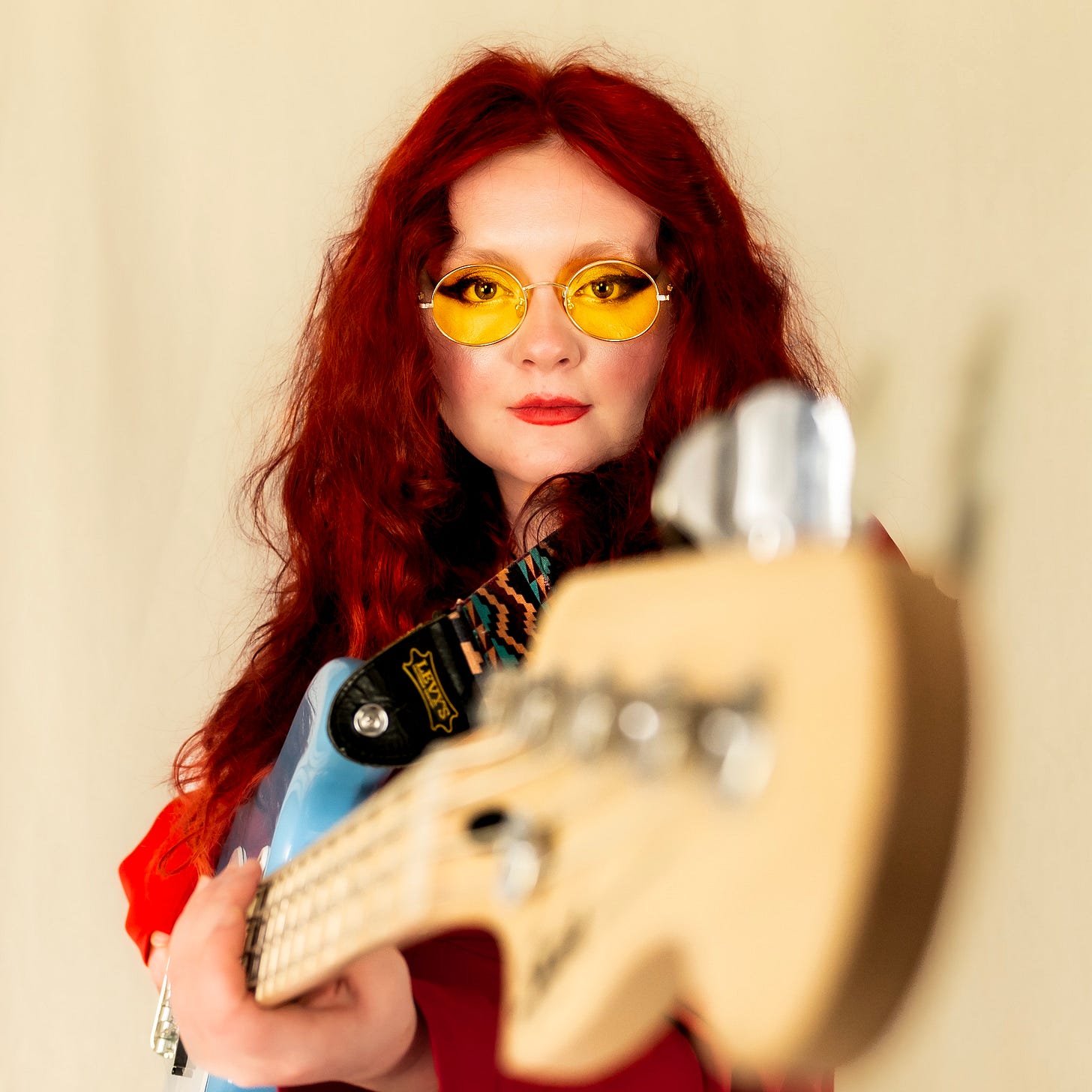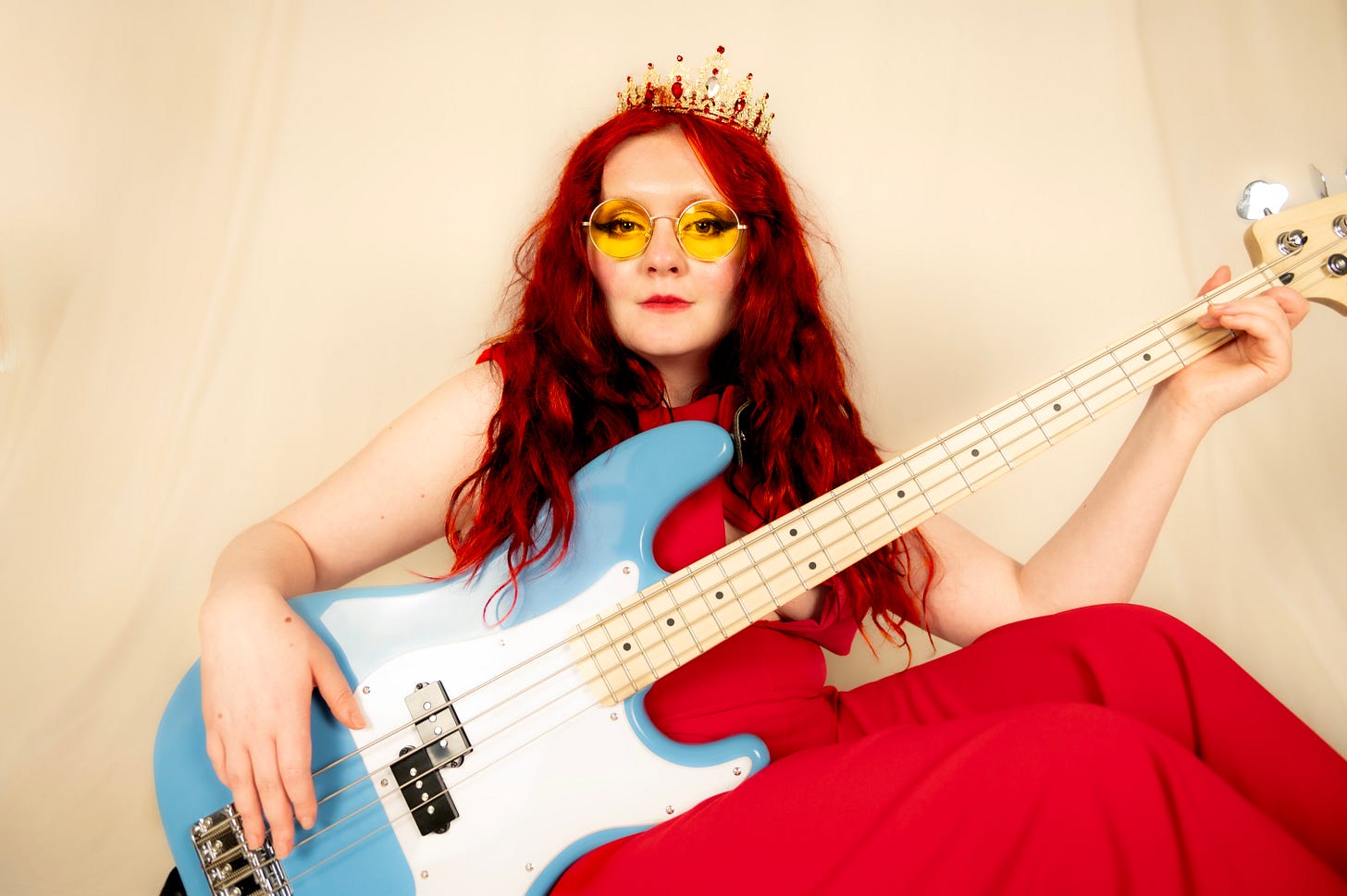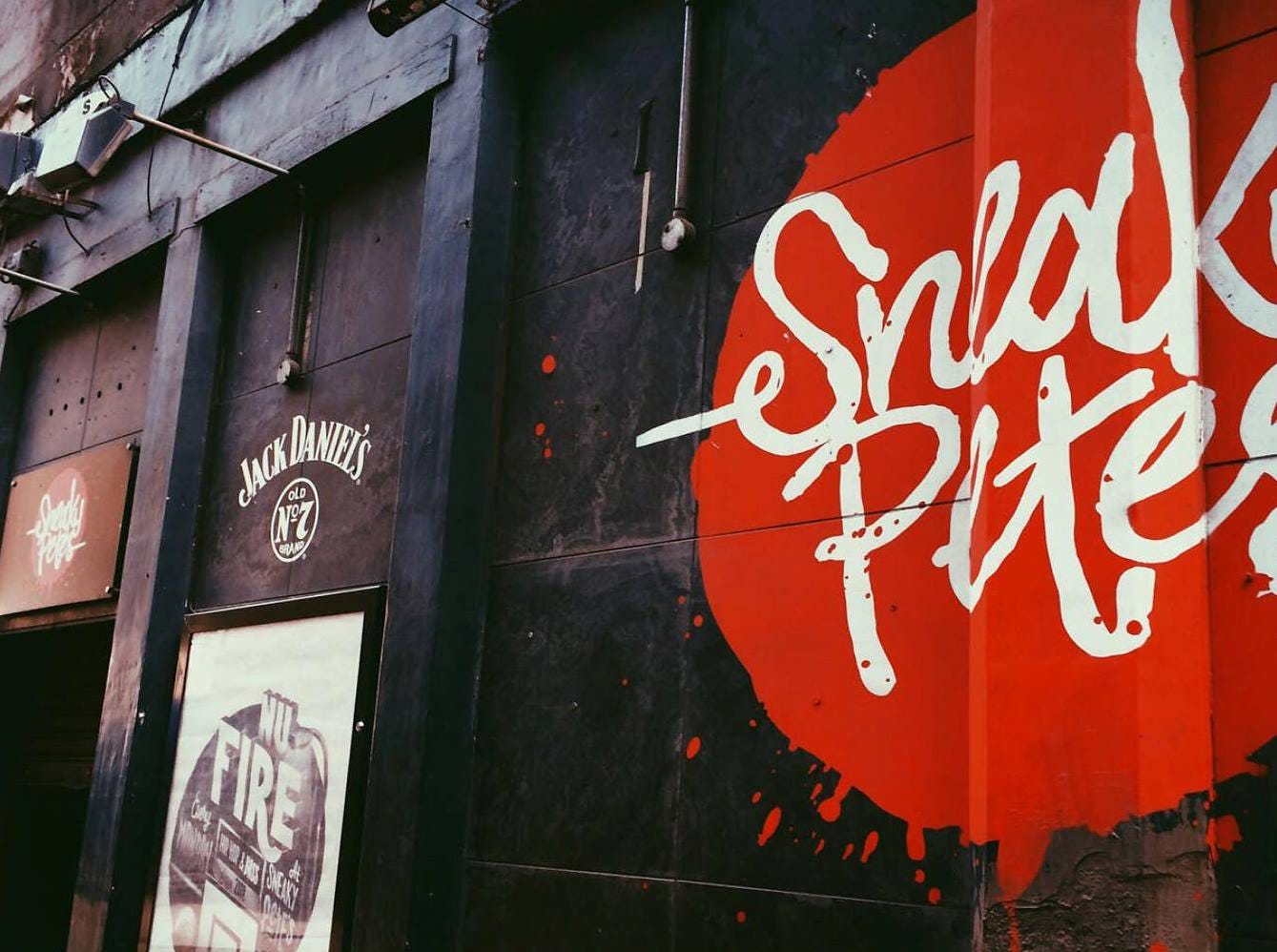The Fur Coat Queen making music on her own terms
Rising star Megan Black on refusing to follow the rock rule book and courting Stevie Nicks
Megan Black owns her stage. Pacing up and down in a long red jumpsuit and heeled boots, voluminous cherry-red hair and amber-tinted glasses frame her face as she sings songs entitled “Freedom Belongs to Him” and “Fuck you (you stole my youth).” Her voice is as powerful as her stage presence; the image and the sound make for a cocktail of Fleetwood Mac, the Rolling Stones, and Freddie Mercury.
All the more surprising, then, to hear her speaking to her crowd in a gentle West Lothian accent, talking openly about how nervous she is, but how much fun she’s having anyway, writes Sarah McArthur.
This is a young artist on the rise, already a musical award winner who has performed on both sides of the Atlantic.
“Me performing-wise is very different from me day-to-day,” says Megan, sitting with a tea in her Edinburgh flat. “I think Megan Black as an artist is the version of me that I want to be… I think the confidence and the way I present myself when I’m in that mode is probably more who I want to be and who I’ll learn to be by the time I’m an old lady,” she laughs. The self-proclaimed shy small-town girl, and her sassy musical alter-ego, are well on their way in the music scene.
Megan Black’s brand of 1970s sounds, with lyrics for a young 2020s audience, was an immediate success. The Livingston local’s first song, Fur Coat Queen, was nominated for BBC Radio Scotland’s Singer-Songwriter Award in 2019, and her debut EP “Full Circle: Part 1” was named Scottish EP of the year. The last twelve months have seen her perform across Scotland and beyond, including London, San Francisco and Los Angeles.
Late to the party:
But Black’s life hasn’t always been about music: “Even when I’ve tried to quit music I’ve always been steered back to it” she says. The daughter of a retired professional footballer, she had no musical relatives, and very little family money for private music tuition, Megan didn’t discover her love for music until her grandparents bought her singing lessons at the age of 15.“It was a total 180 once I got into music… It was kind of crazy, but it just felt very natural” she says, explaining how music swallowed all of her time in final years at school.
In the midst of mental health challenges and a dramatic drop in self-confidence, Black dropped her plans of pursuing music after school. At a loss for where to go, she thought about theatre production, worked in a bank call centre, and eventually auditioned for acting at Napier University. But after the singing section of her interview, a tutor took her aside, asked her why she wasn’t pursuing music over acting, and encouraged her to pursue music despite her lack of self-belief. “This guy, like I owe him so much…” Black muses.
Nostalgic sounds, progressive lyrics:
Now fully embedded in the music industry, Black is combining new and old sounds “For me it’s about combining that 70s rock, that kind of nostalgic sound, with things that are actually important to me, and talk about my own experiences.” says Black.
As a naturally introverted person, Black uses her musical persona to speak out on issues she wouldn’t have the confidence to bring up as her off-stage self. “Writing songs and doing everything it’s almost like a form of therapy for me- when I’m in that mode of Megan Black I’m so confident and outspoken, whereas me as myself I’m not like that at all,” she says.
Her song, “Fuck You (You Stole My Youth)” is about her own experience of rape as a young woman. “This song was about me sort of, going through the experience of realising how serious I had gotten, I think when something like that happens to you all the joy that you have gets snatched away.” Black feels it’s particularly important to keep talking about the issues of sexual assault in the music industry: “Working as a woman in music, the amount of sexual harassment that goes on and everything that goes on in the music industry that women have openly talked about and people just go ah get over it.. It’s horrible” she says.
Black is also keen to be a role-model for young queer Scottish audiences, as someone who struggled to come out as a teenager. “I will always be proud of where I come from but it’s such a stifling environment when you’re growing up as a young queer person… There's a set of unspoken rules I think, growing up in a small town. I’m from the same place as Lewis Capaldi and the Snuts and people like that and they’re incredible artists and deserve every success possible but they don’t represent me. I don’t feel represented by them because they remind me of the people I watched growing up getting opportunities because they fit the expectations whereas for me I thought I can’t come out, that’s not an option… I think growing up as that sort of young queer person, Megan Black is this idea of who I wanted to be and who I still want to be and I think my goal when I’m making music… I do think I have younger Megan in mind even subconsciously.”
Neurodivergence and networking:
Black’s success is even more impressive considering her resistance to the million-miles-an-hour music industry. Now teetotal, and recently diagnosed with autism and ADHD, she spoke about the challenges of networking in her industry. “I find it quite challenging to be a musician and be neurodivergent because I think a lot of opportunities and a lot of community and network is created through just being there, being at events… even for me being sober as well. Drinking with people going out partying and stuff that is not necessarily a bad thing, but it's where a lot of connections are formed, and I feel like an outsider to that because I just don’t have the social battery to do it.”
However Black suspects it’s not only neurodivergent musicians who struggle to deal with the heavy social side of the music industry, and has made her peace with skipping events or leaving early when she needs to rest. “I think I just have to accept it, and I think there’s probably more and bigger artists out there that we all look up to and they feel the same way and didn’t go to every party,” she says.
This doesn’t mean that Black refuses to put herself out of her comfort zone. Earlier in the year, she launched a viral social media campaign, asking Stevie Nicks’ tour managers to book her as the support for Nicks’ Glasgow performance. While the campaign didn’t get her the support gig, it did gain the attention not only of Nick’s team (who sent a very encouraging thanks but no thanks) but also BBC Radio Scotland. “It felt so cringe,” Black says, “but I’ve learned if you want publicity you just have to get comfortable with being cringe.”
She’s also developing her own strategies of dealing with the high-pressure sector; when it comes to the inevitable rejections and imposter syndrome, she says “it sounds weird but I just kinda let [musician] Megan Black deal with that… when I’m just chilling in my house or working and I get a rejection email I just don’t feel connected to it because this isn’t me, it’s her they’re rejecting, and she doesn’t give a shit.”
Another vital support to Black’s career, and confidence, has been the musical community she has found studying at Edinburgh Napier and performing in Edinburgh. Although she originally moved into the capital simply for her university course, the music scene has provided her a supportive and vibrant environment to kick-start her career in. She has also met all of her much-beloved session musicians in bars across town or through her studies. “I think there’s a lot to be said for the music scene in Edinburgh particularly I think there’s a lot of great promoters in Edinburgh particularly Sneaky Pete’s is possibly my favourite. The team that works there they just seem to really value live music,” she says, also giving an honourable mention to Summerhall.
The only way is up
Having signed with an agent earlier this year, and with a new album in the pipeline, we can expect to see more of Megan Black soon. Black says the sound of her music will continue to explore the sounds of 70s blues-rock, while the tone of her lyrics will be slightly different.
“I wrote the first album which came out 2022, I’d moved into a tiny little flat, it was my first time moving out, and I wrote the album in there and I was just filled with rage, I was in the midst of quite a heavy drinking problem, and I’d gone through a really traumatic experience with a man, and I just went head-first into feminism, to the point where I was just so angry about the way things worked, and I think I put so much pressure on myself to be this perfect feminist, that it was kind of the extreme… Now my song-writing process is much more balanced in my own views, it’s still about my experiences and I am a feminist and a queer woman but I think I can do all those things without taking myself too seriously.” she says.
Black hopes to release her album in Spring next year, and by all accounts it’s set to catapult her career even further. But with her studies recently finished, and another California tour in the diary, it may not be long before Black is all over our headlines, but no longer in our city. If you want to catch her before she’s gone, you can follow her social media for performance updates.




